“Two to Go,” by Douglas Petrie
Say what you will about S6 of Buffy the Vampire Slayer, it is packed. So much so, that this penultimate episode opens with Xander announcing: “This is what happened this year.” We get an extra-long series of clips, which offer a detailed account of Buffy’s resurrection, the coming together and apart of Spuffy, Willow’s addiction arc, Dawn’s thieving and the failure of the XandAnya wedding to come together.
We also, naturally, see Tara’s tragic demise and, as a piece de resistance, Willow’s violent dispatch of Warren.
With everyone all updated, we find ourselves with Buffy, Xander and Anya as they sprint through the woods in pursuit of Willow… or they’re trying to pursue, until Xander gets nauseated. They’re grossed out and horrified by Warren’s execution, and set on keeping Willow from scoring the hat trick by moving on to Jonathan and Andrew. The one tiny upside is Anya can get to the troublesome two first, via teleportation.
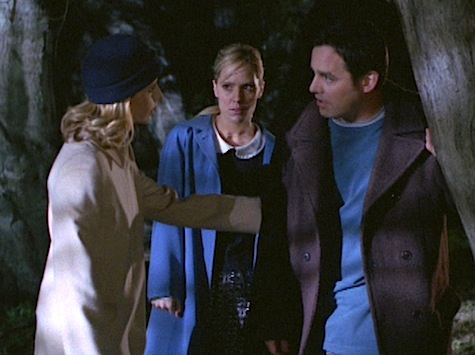
This is good, because Willow has had the foresight and taste to put Xander’s purple car out of its misery. But there’s no time to stare at the steaming wreckage. Buffy runs on ahead. Xander is left alone to feel useless as he tries, manfully to catch up.
It’s the calm before the pyrotechnics and so over at County Jail, everything’s very quiet. Andrew’s trying to hear or decode imaginary signals from Warren. Jonathan is filled with contempt for him and his partners alike. This eventually leads to them slapfighting, much in the tradition of Xander versus Harmony, until Anya teleports into the cell and updates them on their incoming mortal peril.
Andrew, upon being clued in, says: “Oh my God, Warren!”
Jonathan, more on point: “Oh my God, me!”
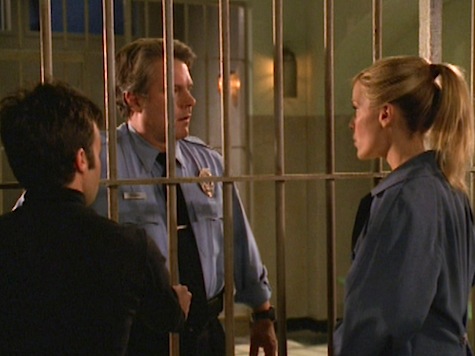
Anya tries to convince the on-duty officer that he needs to let the boys out of the cell so she can save them. She’s quite impressive and rational, but we’re left to deduce that this particular officer is neither bright nor imaginative, and possibly that he hasn’t been in Sunnydale for very long, doesn’t have a child in the school system, never goes out at night and has a black belt in the fine art of “La la la, I can’t hear you.”
Despite Anya’s best efforts, Willow is soon on the scene, busily tearing the lock-up into wee stony pieces. She has gone from being a girl who considers eating her banana outside of recommended snacking hours a major offense to one who will commit massive public vandalism in front of the entire police force. Andrew whines about not bearing responsibility for her grief and rage. Jonathan is buying in, though. He knows he enabled Warren; he knows that he has to answer for both Katrina and Tara.
The cops are no match for the world’s most adorable witch on a rampage. Anya told them so, but would they listen? But Buffy has arrived, and she sneaks in the back way and spirits Willow’s intended victims out of the cell before she can defenestrate them.
They don’t get much of a head start. Anya, who is quietly heroic throughout this episode, tries to buy time by reasoning with Willow. For this, she gets zapped. It’s looking like the remains of the Trio may have to make a run for it when Xander shows up with a borrowed police car and they all zoom away. Buffy’s entire plan is hide the guys and then deal with Willow: when they complain that this hardly represents advanced tactics, Xander offers to boot them out onto the road.
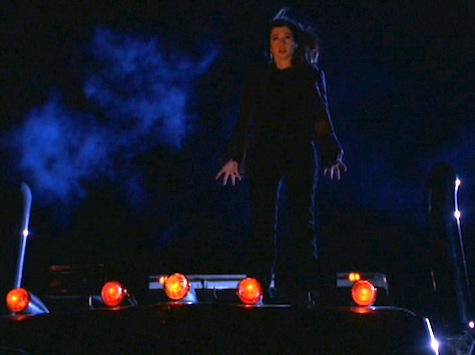
It will surprise none of you to know I love Danny Strong in “Two to Go.” He’s reminiscing here about high school and the days when Willow was “just Willow,” neglecting to remember all the times when she interrogated him as a suspect in various school mystical mysteries. Ah, the memories. She responds by coming after them with a magically commandeered eighteen-wheeler. She’s only too happy to ram the police car, BuffXander and all, but then they all catch a sort of lucky break. Which is that she runs out of power before she can turn them all into road paste.
Dawn, meanwhile, is getting restless down in the Crypt of Spike, which you’ll recall is now under kinder, gentler, floppier management. Clem’s trying to do a taste test with her on some cheesy chip-like items. When he realizes he’s bored her so badly that he may have hit an all time high for perpetrating evil—for Clem, the wickedometer is set low—he offers to take her to a movie instead. But she upsells him: she wants someone of the demonic persuasion to take her on a fun hunt for Rack the Juice Dealer.
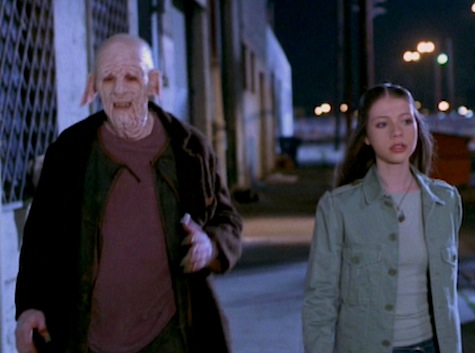
This turns out not to be Clem’s favorite plan, for about twelve reasons ranging from Rack doesn’t like the floppy-eared to what the heck is she going to do if she does find Willow? And what the even more heck is Buffy going to do to him if that comes together? Dawn tells him Spike would’ve helped. He reminds her that Spike’s gone.
This is a nice convenient entry point to zooming back off to our B story, in Africa, where Spike has talked the mysterious cave-dwelling demon into giving him a test of worthiness. He’s then tossed into a kill-or-be-killed fight with a guy who has flames for fists. It’s not a human guy, it turns out, so the chip doesn’t kick in.
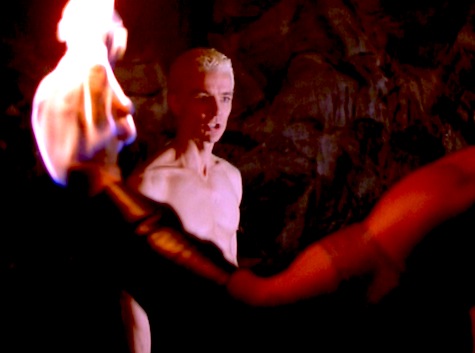
With Willow taking a breather, the remnants of the Scooby Gang run to the Magic Box, looking for ways to stop their crazed friend.
Jonathan offers to help the gang with the Sumerian text in the one surviving book, and runs up against a wall of “Shut up, Worm!” Buffy lays it out for him: she’s not helping them for their own sake, only for Willow’s.
He is the mage on the scene, though, and he’s up on an important plot point. So he perseveres, explaining that Willow is running out of power. Which means she needs more, which means she needs… gosh, someone like Rack would really fit the bill, wouldn’t he?
Wouldn’t it have been interesting if she’d run into Amy on the way over? Or in the waiting room? Would she have sucked her dry too, just for kicks?
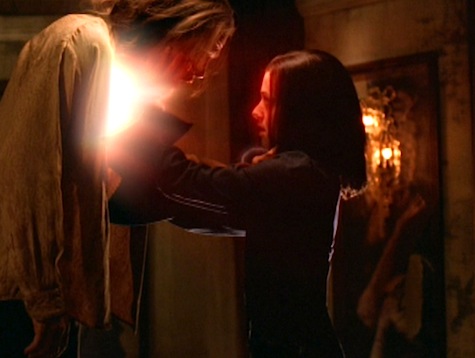
Anyway, Willow is indeed headed over to ye dark magic drug shoppe. Rack runs his usual creepy patter on her, complete with groping and talk about her dark juices. Oh, yuck.
It’s inconvenient for the Scoobies, but I’m not even a little bit sorry when she sucks him completely dry, just in time for Dawn and Clem to arrive. Clem’s such a chicken that he waits in reception while Dawn beelines for the inner sanctum. This leaves her alone with what’s left of Rack and with Willow.
Willow’s super-veiny, vaguely stoned and pretty darn mean. Dawn tries to calm her down and, for her trouble, gets offered an opportunity to go back to being a Key. Buffy shows up just before the Dawn haters in the crowd start to get their hopes up.
Over at the Magic Box, translation of the anti-magic book is not going well, in part because everyone is having so many feels. Andrew thinks he and Jonathan should turn on the gang and form a shiny new Duo. He goes on to point out to all present that Willow’s not necessarily going to stop when she’s done with the two of them. Does she care at all about her friends anymore? Anya thinks not. The thought that neither she nor Willow cares if he lives or dies damn near breaks Xander’s heart.
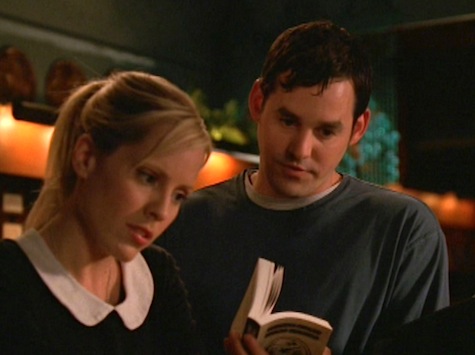
She replies that she does care but hasn’t decided yet. Somehow, this ambivalence of hers is lovely and believable. It makes me wish there’d been a one-off story where Anya and Jonathan teamed up. Something on the order of the episode of Alias where Malcolm had to dig Jennifer Garner out of a deathtrap coffin, or something, with no ninja helpers whatsoever.
Xander, going with the ‘it’s suddenly about me’ moment, asks Anya if she’s going to turn on him. She tells him she can’t wreak vengeance on him, and he brings up her interlude with Spike. Somehow that brings them to discussing his terrible guilt over somehow failing to stop Warren before Buffy and Tara got lethally perforated. He’s feeling exceedingly useless.
Speaking of feelings and the sharing of same, Buffy is trying to get Dawn out of Rack’s and stand Willow down. Willow comes back with a self-loathing monologue about what a mousy loser pre-magical Willow was.
“And now,” she says, “Willow’s a junkie.”
You can’t blame her for feeling as though all she had of worth was her relationship with Tara. It’s not true, but we all get demoralized sometimes. She’s had a rough year, and Tara was mighty terrific. I miss her already.
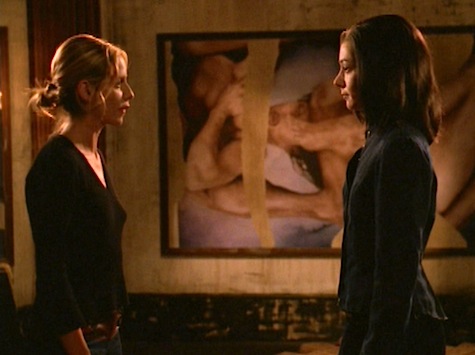
“You’ll lose everything,” Buffy argues. “There’s too much to live for.”
This is the heart of the episode, this quick exploration of Buffy and Willow and their tangle of mutual unhappiness. It’s not a stretch to say that each is unhappy largely because of the other. Not only has Willow’s magic brought Buffy back from Heaven, but Willow became the magician she is only because of her involvement in the business of slaying. As for Tara, she’s collateral damage in the good-evil war. So the life-affirming statement is a tactical error; Willow is delighted to respond by pointing out that Buffy has been miserable ever since she became not dead.
All of this chit-chat, it turns out, is mostly just a way of covering a spell to teleport them all to the Magic Box. Take that, Anya! Anything you can do, I can do better.
(Why does she bring Buffy? Keep Dawn by all means, but forcing Buffy to jog across town, yet again, would seem like decent planning.)
Buffy and Dawn are nauseated and fainty after the transition. Willow turns her back on them and tries to give Jonathan and Andrew a big, lethal zap. But XandAnya did manage to get the antimagics working. Anya’s tucked in a corner, chanting quietly, to protect the Undeserving Two.
At this point, I’m sure you’re wondering: how’s Spike’s making out with flame guy in Africa? The good news is hurrah! That guy’s dead.
The bad news? “You have passed the first stage of the test,” says the deep-voiced demon. Meaning: Wait! There’s more!
Always read the fine print, William.
Though it is excessively disappointing to realize that she can’t zap her targets to death, Willow gives herself a strength boost, with the idea of giving Jonathan and Andrew a lethal pummelling. That’ll be more personal anyway, right? And it means she and Buffy can finally come to blows.
You kinda have to rub your hands together.
The two besties square off. Xander, the minions and Dawn flee the Magic Box while Anya stays behind to maintain the shield.
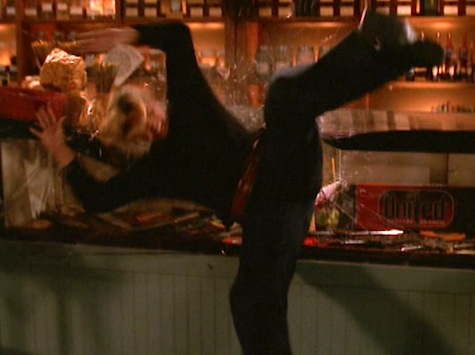
Kickboxing ensues! Also, a little bit of unkind name-calling. This Buffy-Willow throwdown is a more brutal, strength-based fight than the various Buffy-Faith battles—there’s less finesse on both sides. As the two of them bash the Magic Box to bits, Anya’s cover is revealed.
By now, Andrew has decided he doesn’t want to run off with Xander and hide. He even pulls a sword on him, but Jonathan intervenes, declaring. “When this is over you and I are going back to jail to do our time.”
It’s not a great surprise, this development, but it’s still a “Yay Jonathan!” moment. Not that it’ll mean much if he gets slaughtered.
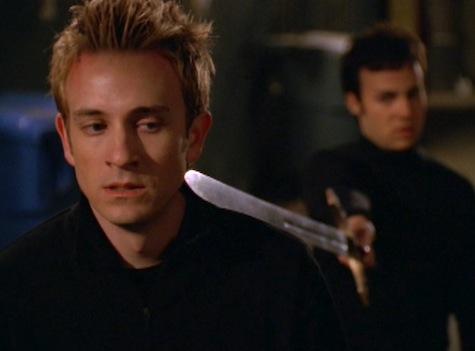
Anya, once again, fails to out any demon tricks to defend herself, and so SuperWillow chucks her across the room. Then she pounds the stuffing out of Buffy, too, and gloats that nobody in the world has the power to stop her.
Zap! Someone throws her, using mystic forces, across the remains of the shop.
“I’d like to test that theory,” says…. and look, everyone, it’s Giles!!!
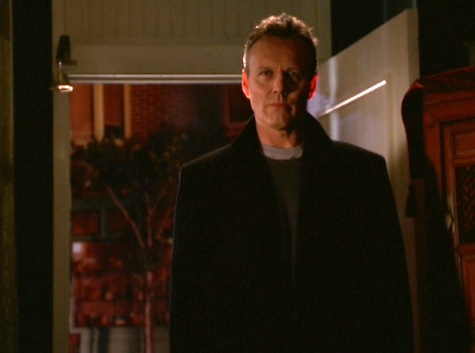
Next: Scary Veiny Willow versus the Power of Friendship
A.M. Dellamonica has tons of fiction up here on Tor.com! Her ‘baby werewolf has two mommies,’ story, “The Cage,” made the Locus Recommended Reading List for 2010. There’s also “Among the Silvering Herd,” the first of a series of stories called The Gales. (Watch for the second of The Gales, “The Ugly Woman of Castello di Putti”!)
Or if you like, check out her sexy novelette, “Wild Things,” that ties into the world of her award winning novel Indigo Springs and its sequel, Blue Magic.










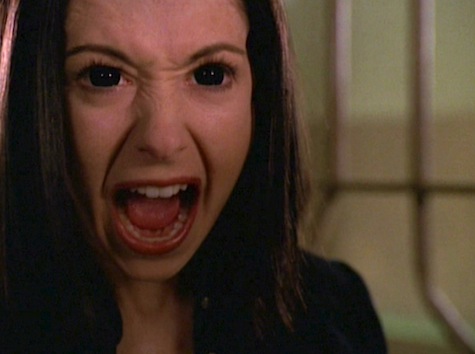
I actually liked the final four episodes of Buffy Season 6. We finally (FINALLY!) got to see Willow with the Cosmic Cracklin’ Power o’ The Gods.
It doesn’t matter that the plot doesn’t make any sense, the shear spectacle of the final episodes were enough. Besides, the blame for the ruin that is Season 6 rests decidedly on Marti Noxon’s shoulders.
I’ll admit that I wouldn’t have minded too much if Willow had offed the duo. Undark Willow might have felt bad about it eventually, but maybe not as the duo certainly weren’t sparlky clean paragons of virtue.
My favorite part of this trio of last episodes is Willow’s spinny-room-teleportation-spell-monologue. I got chills when I realized what had happened the first time I saw it.
As soon as Giles enters the room, you feel a surge of relief that makes you realize how much this show has missed not having Giles in it for the second half of the season. This show really NEEDS Giles in it, for the relationship dynamics to work properly. Without him in the mix, it lists and lurches alarmingly.
Me too:
Instead we get Anya teamed with the loathesome Andrew in “End of Days”, season 7 — wheelchair fight! in the hospital, with Anya’s observance that humans:
Anya deserved so much more than this. She should have survived. She made herself a real Scooby. Andrew and Kennedy — never.
Love, C.
Is there anyone who doesn’t love Giles?
Love, C.
To the best of my knowledge, Zorra, no. Everyone adores Giles.
OOH, I was about to chime in anyways, and you all set it up perfectly!
Is there anyone who doesn’t love Giles?
*raises hand*
I DID love Giles, but after this season, no, not anymore. I know in 10 minutes he and Buffy’ll be yukking it up, “Oh you remember that time, that most harrowing experience of my life, and YOU JUST ABANDONED ME! GOOD TIMEZ!” But I can’t.
Yes, I cheered when he showed up, and said that line. But that following scene in the dojo leaves me cold, and I’m glad that next season they kinda ignore it, and actually treat the story of Giles leaving as it should have been, with everlasting consequences to their relationship. I know this upsets a lot of fans, but I know that to get a GOOD story, you have to let the writer tell the story they want to tell, so I roll with this stuff.
The deconstruction of the benevolent patriarch becomes a recurring theme in Whedon’s work, and while there are those who think this stems from his own issues, I think it comes more from his limited understanding of feminism, because these dysfunctional fathers are always paired with daughters.
Well, I for one just love that scene to pieces! I thought it was brilliant. What else can you do except laugh in the face of so much pain, misery and bad choices? This is how you move on. Well, it’s one of the ways, anyway.
This is why all the people I know who work as doctors tell jokes about death, dying and illness relentlessly.
I laughed too, but it brought no resolution. Buffy just said, “You were right to leave us” and NO, NO HE WASN’T!!! (I know all the reasons why ASH left, not judging, I’m judging Giles the character).
@5 Seriously? She CHOSE to twice become a demon, and if the dead guys at that fraternity didn’t particularly bother me it still means she is evil, but I suppose because she is quirky, honest, pretty and funny, people give her a pass for all the death and mayhem she has caused.
The ‘Bad Dads’ aren’t always paired with daughters (Liam & his father).
Giles did what he thought was right, even if his timing did suck.
Tara’s father lied to her, and wanted to take her home for selfish reasons, but she might not have gotten dead so young if she’d gone with him.
Spike is selfish in his reasons for wanting Buffy to stay with him, but he’s not wrong about the darkness inside her, or her need to deal with it. She chooses not to, and it comes roaring back (just when we think it’s all good), threatening to overwhelm her completely.
Whedon has publicly stated that he was working out his issues on the show.
“I was thinking of you” (or something of the sort) was probably one of Whedon Sr.’s reasons for sending him away like he did. I find it unsurprising that there’d be a lot of resentment and hard feelings to work out btwn the two of them. s7 is about Forgiveness for a reason.
Yay Giles ! That last moment gave me chills.
I don’t understand the hate for this season. Some things are shaky, I admit, but it gave us a lot of good moments and I like the depressive theme of the season, it was a big but natural change in the show. It’s still way better than season 4.
I would definitely agree that it ends better than S4. Adam, as a villain, lacked many somethings that Dark Willow has in abundance. We connect with her, emotionally, because we know her and understand the source of her badness.
@8. & 10. Aeryl –
Great comments.
I never stopped loving Giles as a character, but the last two seasons of the show changed the way I looked at him and his relationship with Buffy, not just in S.6 and S.7, but over the entire course of the series.
In a way, I think that Buffy was correct when she said that Giles was “right” to leave, but it’s an instance of being right for the wrong reasons. His stated intention for leaving was that she had to stand on her own feet without having her ‘father’ there to lean on, but she ended up learning that lesson far better than he had clearly intended, to the point that she starts to realize that she has grown beyond what he has to offer her as a mentor.
This is what comes to a head over the course of the 7th season, culminating in the end of “Lies My Parents Told Me”. Spike, of all people, probably had the best grasp of what went wrong between them when he confronted Giles and the rest of the group in “Touched”.
On re-watches, I have actually come to think of Giles as being in a number of ways one of the primary obstacles that Buffy has to overcome in the last season – a curious departure from his former role, but one that interestingly works rather well with his preceeding character development.
…
With all that being said, his appearance at the end of “Two to Go” is easily one of the single most wonderful moments in the entirety of the show, almost on a par with Buffy’s line – “Me.” – from “Becoming Pt.2”. I’ve watched this episode three or four times, and I have never once failed to let out a cheer when he says that line.
@14. AMDellamonica –
I actually don’t really think of Dark Willow as truly being one of the ‘Big Bads’ of the show – not in the same way that the Master, Angelus, Mayor Wilkins, Adam, Glory, and the First Evil were. She’s definitely a great antagonist, and her appearance over the last three episodes of the 6th season makes for some wonderfully gripping television, but to me she has more the feeling of being a ‘final obstacle’ than being the season’s big bad herself.
In fact, I would argue that Dark Willow is better seen as being the final and ultimate victim of the season’s true Big Bad. Joss Whedon has been quoted on several occasions as saying that this is meant to be “life itself”, but I think that a more accurate descriptor would be “despair of life, and its hardships”. It feels more resonant to me that we should watch Buffy battling against this enemy for most of the season and finally managing to throw off its influence (in “Normal Again”), only to have Willow immediately afterwards succumb to the same foe.
This is why I think that it is thematically important that it is Xander, rather than Buffy, who ends up saving Willow (and the world) from herself at the end of “Grave”. Not just because Xander really needed a major redemptive moment after all his lowpoints in this season, but also because, whatever else she might have gotten wrong, Dark Willow obviously touched a nerve when she accused Buffy of “hating it here” as much as she did. Buffy is mostly recovered from her season-long struggle with re-committing to the World of the Living, but she still needs to have her revelation at the end of “Grave” before her own seasonal journey is truly complete.
It also makes more sense in character terms. As you wrote in the post above, Buffy and Willow have a truly awful tangle of mutual grievances that they’ve been building up over the season. This is probably a large part of why their epic brawl feels so satisfying to watch – these two seriously needed a chance to vent what they were feeling at each other before they could have a shot at catharsis.
It also makes their eventual reconciliation in “Same Time, Same Place” all the more touching, and one of my favourite moments in the 7th season.
Re Anya’s earned points to continue @5:
No one complains of Spike’s earned right to continue. Or Angel’s. This is a strong demonstration of the differences in how we judge women and men for committing or not committing the same actions.
I remember the whole room at college breaking into cheers when Giles shows up. Epically great moment.
@17 Zorra,
I must disagree. The difference here is not that Anya is a woman and Spike and Angel are men. The difference is that Angel and Spike are reformed, and Anya has reverted to vengeance demon. Does the phrase “Looks like someone slaughtered an Abercrombie and Fitch calatog in there” ring a bell?
When Angel went bad he had to re-earn his respect and cred. Same for Spike. Why should Anya be held to a different standard?
@19. I agree. We’ve already discussed why/how the other characters let Anya slide for the things she’s done. Yes, she’ll voluntarily give up her powers in s7 (and then she dies), but she also chose to return to being a demon in the first place. Spike and Angel don’t have that option. Although, in I Will Remember You (AtS), Angel does have that option when the Mohra blood makes him human. He chooses to undo it, to be a more effective fighter.
We all ass-u-me that Spike would’ve killed that woman in Wrecked. We can’t know that for sure, or how he would’ve felt about it if he had, b/c the chip fires. It’s possible he might’ve stopped himself in time (we’ve already seen him practice self-restraint), or sworn off killing afterwards. He’s smart enough to know that Buffy would never have him – would, in fact, stake him right and proper – if she found out he’d gone back to killing. Then he would have to decide which he wanted more.
Slightly OT: I know some of you also watch OUaT. Have you seen Good Form yet? Hook is so the new Spike. Throw in Emma as Buffy and Neal (Neil?) as Angel and there ya go.
Well then, you’ve told me. Yet, what is Anya doing there at the end of season 6 and in season 7? Not enough reformation evidently for some of us.
However, I still believe it was, particularly in relationship to all the other rottenesses the other Scoobies perpetrated over the years.
@21. Anya voluntarily goes back to being a demon, but she’ll give it up b/c it’s no longer a good fit for her. She has changed. It’s just weird to me that her redemption story is so low-key in comparison to Spike’s, even tho’ she did more damage over a longer period of time. I s’pose Spike’s story got more play ‘cuz: Buffy.
Cordy’s wish (which introduced us to Anya) wasn’t even that vengeance-y, but it had disasterous tho’ reversable consequences. We can’t know what Spike’s wish was going to be in Entropy, we were meant to think it was vengeance on Xander, but it might’ve been something else entirely (wishing he’d never come to Sunnydale, perhaps). Still, Anya stops him. It’s not wise to make a wish in front of a Vengeance/Justice Demon. Maybe they’re obligated to grant said wish?
I can’t shake the feeling it has something to do with the addiction metaphor. There’s more judgement, IMO, on vamps, and that’s the best explanation I’ve come up with so far. Addiction’s gonna be an issue for you, if it affects someone you love/causes that someone to hurt you.
I didn’t care much for Anya at first, but she definitely grew on me. That’s also true of Wes (especially over on AtS – btw, he had a Bad Dad too). Kennedy I liked at first, then came to loathe. I found Andrew to be a whiny, useless, annoying little POS from the get-go.
I think they are obligated to grant the wish, once it’s uttered, no matter what it is.
@23.
They are obligated to grant the wish, but as we see in several episodes, particularly at the beginning of S.7, they have have a fair amount of leeway in deciding exactly how to interpret the words of the person who makes the wish. And once the terms of the wish have technically been ‘fulfilled’, it seems they also have the capacity to undo it, up to a certain limit – as we see in “Selfless”, there are some changes which, once made, can’t be undone short of sacrifice on the part of the Vengance Demon in question.
It’s never made explicit, but I formed a bit of headcanon that the principles of wish-world-building that were articulated by Adam in “Superstar” also apply to Vengance Demons, and act as something of a check on what they can do with their powers: the changes they make cannot depart too much from the currently existing reality, or the alternate ‘wish-verse’ will be too unstable, and inevitably fall apart. This is how I interpret what happened in “The Wish”.
@22.
I don’t think that it’s really important which of them did the “most” damage in their lives prior to events of the show. Spike may have been around for only a fraction of the time that Anya was, but he still amassed a bodycount that is implied to have run into the hundreds, not to mention all the other assorted crimes and atrocities that vampires routinely get up to. There comes a certain point where arguing about who needed to atone more for their crimes becomes an exercise in futility.
I also don’t think that the theme of addiction has anything to do with Spike’s character arc at this point, or with Anya’s for that matter. The addiction theme is a strictly seasonal one, and it gets no particular play outside of S.6, except for a very brief mention at the beginning of S.7, which was mostly about the writers (using Giles as their mouthpiece) dismissing it as no longer relevant – thereby acknowledging, I think, that it was the biggest mistake they committed in the 6th season. In that season, the characters that it mainly affects are Buffy and (especially) Willow, and Dawn too, if you want to count her kleptomania as a form of addiction.
Unlike the other main characters, I don’t see Spike as having a notably distinct theme to his character arc in Season 6. Rather, I see what happens to his character development in S.6 as being an extension of the same arc that began in the 5th season, and which doesn’t conclude until the end of the 7th season. We see the same thing with Anya to a much lesser extent – most of the development that she gets in this season doesn’t really recieve its payoff until “Selfless”. (After that she largely fades into the background for most of S.7. I love the last season of Buffy a great deal, but one of its major flaws was that some of the characters – particularly Xander, Dawn, and Anya – got less attention paid to them than they deserved).
In fact, I’ve seen it argued (and I think there’s merit to it) that Spike’s entire arc in the 6th season is less about making him grow as a character than it is about having him explore the growth which he experienced in the 5th season, but never really reflected on at time. As has been discussed previously, it is his simultaneous revelation (sparked by the events of “Seeing Red”) of the extent and limitations of his capcity to change that acts as the catalyst for his quest to recover his soul – the consequences of which get dealt with in S.7.
Getting back to the subject of the way that Spike and Anya are treated in terms of their need and capacity for ‘redemption’, I’ll just stress once again that the main mistake I think people make on this subject is to confuse the differences between how the Scoobies treat them with how the show itself treats them. The fact that the SG are far more welcoming to Anya than they are to Spike should not be considered strange or surprising at all. Although her relations with the various Scoobies (particularly Willow) were sometimes strained, in the entire run of episodes from “Doppelgangland” to “Entropy”, Anya never once consciously attempted to harm or work against the Scoobies or anyone close to them – something that cannot be said of Spike. And more to the point, Spike never recieved an entrée to join the group in the form of a close emotional connection with one of its members (which was how Angel, Oz, Cordy, Rielly, Tara, Anya, and Dawn all became Scoobies at one point or another) until Season 7, when he actually began to develop a healthy relationship with Buffy for the first time.
One more point. When discussing the differences between Spike and Anya, it is important to note that the show did address the point that the latter basically chose her fate, whereas the former did not. This is actually the crux of what happens to them in “Selfless” and “Lies My Parents Told Me” – arguably the two best episodes in the entire season – and how their fates differ. Anya is required to give up her powers and also offer up her very life to demonstrate sincere repentence and atonement for her crimes. Spike by contrast is able to resolve his spiritual torment and finally master control of the demonic aspects of his nature by accepting, in his own mind, that he cannot be truly held accountable for the many evils that he perpetrated during his time as an unsouled vampire (thereby forming a powerful contrast to Angel). The newfound strength that he draws from this is what enables him to commit his beautiful sacrifice in the finale, thereby dying as the last thing that he or anyone else would have once expected – a bonafide hero.
At the risk of winding up on the recieving end of some major backdraft, I’ll also say this:
I like Andrew.
To be more specific, I like him precisely for the reason that he is an utterly loathsome little creep throughout most of S.6 and the first 3/4 of S.7, and yet even after all that – even after having reduced him to the very epitome of a pathetic, despicable little man, the show somehow managed to take all that and – in the space of a single episode – somehow transform him into a genuinely sympathetic character. Even after “Storyteller” (one of the episodes that drives my conviction that S.7 is terribly underrated by a lot of fans) I could never bring myself to respect Andrew in the same way that I did most of the other characters, but I could begin to understand and feel sorry for him – no small achievement at all, considering everything that he had done up until that point.
The vampire-as-addict metaphor is fairly widespread and does come into play here, IMO.
Anya’s repentence is real, and comes at a price, but it’s not Hero’s Journey level stuff. In retrospect, there was obviously more to it, but at the time it felt very much like Spike’s transgressions were given more weight.
Buffy (to Spike):
“You faced the monster inside and you fought back.”
Buffy faced the monster inside her in s6, but she didn’t fight back. She turned her back on it instead.
As for liking Andrew…some people like blood sausage. There’s just no acounting for taste.
@27.
This couldn’t possibly be further from what we see happen in the 6th season. The “inner demon” that Buffy has to face in S.6 is the hold that death and darkness formed over her after she was dragged out of heaven, and after a long struggle she breaks that hold decisively. If you have any doubts at all on this front, then I recommend re-watching “Normal Again” and “Grave” in particular.
In fact, that particular line of Buffy’s from “Never Leave Me” (another great S.7 episode) is at the heart of why Spike’s entire argument about her in S.6 – to wit, that she needs to embrace her inner darkness rather than fighting it – is wrong. The key to self-actualization isn’t allowing your inner demons to control you (which is what Spike does most of the time until S.7); it’s fighting them in order to become a better person.
This is what the conversation Buffy and Spike have in her basement in NLM is all about. (quoting another review analysis – note in particular the points made in the 5th and 6th paragraphs):
@27, cont.
The vampire-as-addict shtick pops up every now and then throughout the show, but never in a way that indicates it has any sort of serious thematic relevance, any more than the various jokes about fangs and stakes as phallic objects do.
Again, Anya’s transgressions don’t recieve as much attention as Spike’s do, because up until she becomes a demon again the Scoobies operate under the assumption that she has reformed (whether or not they are correct in this assumption is besides the point), and in any case does not represent a threat to them. Angel got the same treatment before he lost as his soul (after which none of the Scoobies, even Buffy, ever trusted him in the same way again), and arguably so did Spike in S.4, insofar as the SG did unbend for him to a not inconsiderable degree, up until they learned that he had betrayed them.
I still love this episode for the sheer melodramatic perfection of Giles entrance. The first time I saw that I jumped off my couch, punching my fists in the air and shouting “YES!!!”.
I also love his line: “I’d like to test that theory.” It is a brilliant combination of Giles the book-loving scholar and Giles the very hard man. His words “…test that theory.” sound calm and academic but carry an unmistakable implication of “Test to destruction.”
I think a fair number of people must like Andrew, Alex C. or he wouldn’t still be around in the comics.
Perhaps because I’m in a bad mood, or because I’m watching it in Spanish at which I’m far from fluent, but apart from the implicit notion that world’s persecution of Willow represented any creditable judgement or that being a junkie were an horrible failing that (e.g.) getting recurrent malarial fever weren’t, I found myself in close agreement with Dark Willow, monologuing.
I do have to wonder if her appearance were based on that of Valek the Master Vampire in John Carpenter’s Vampire$.